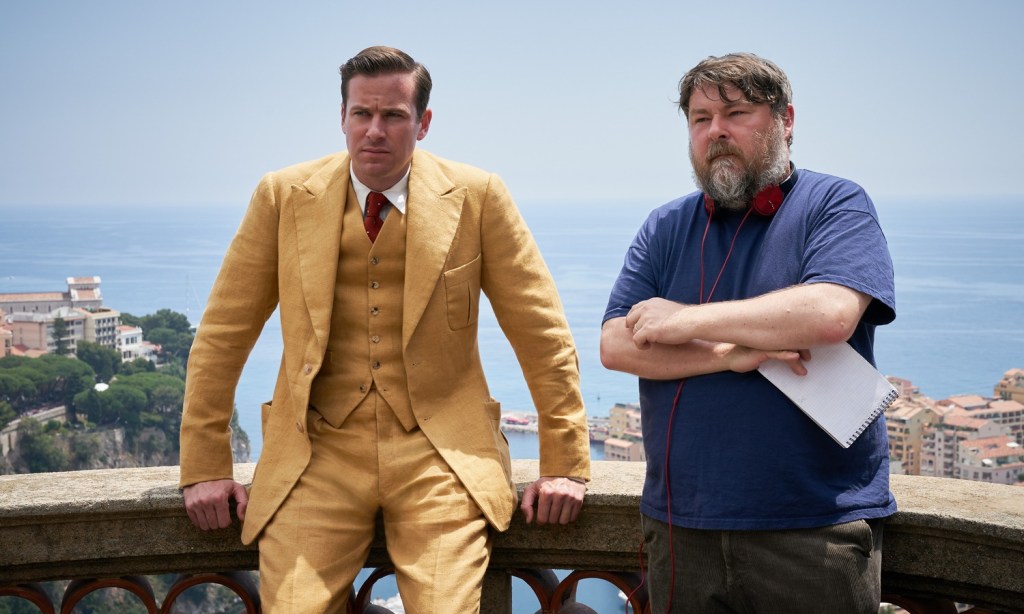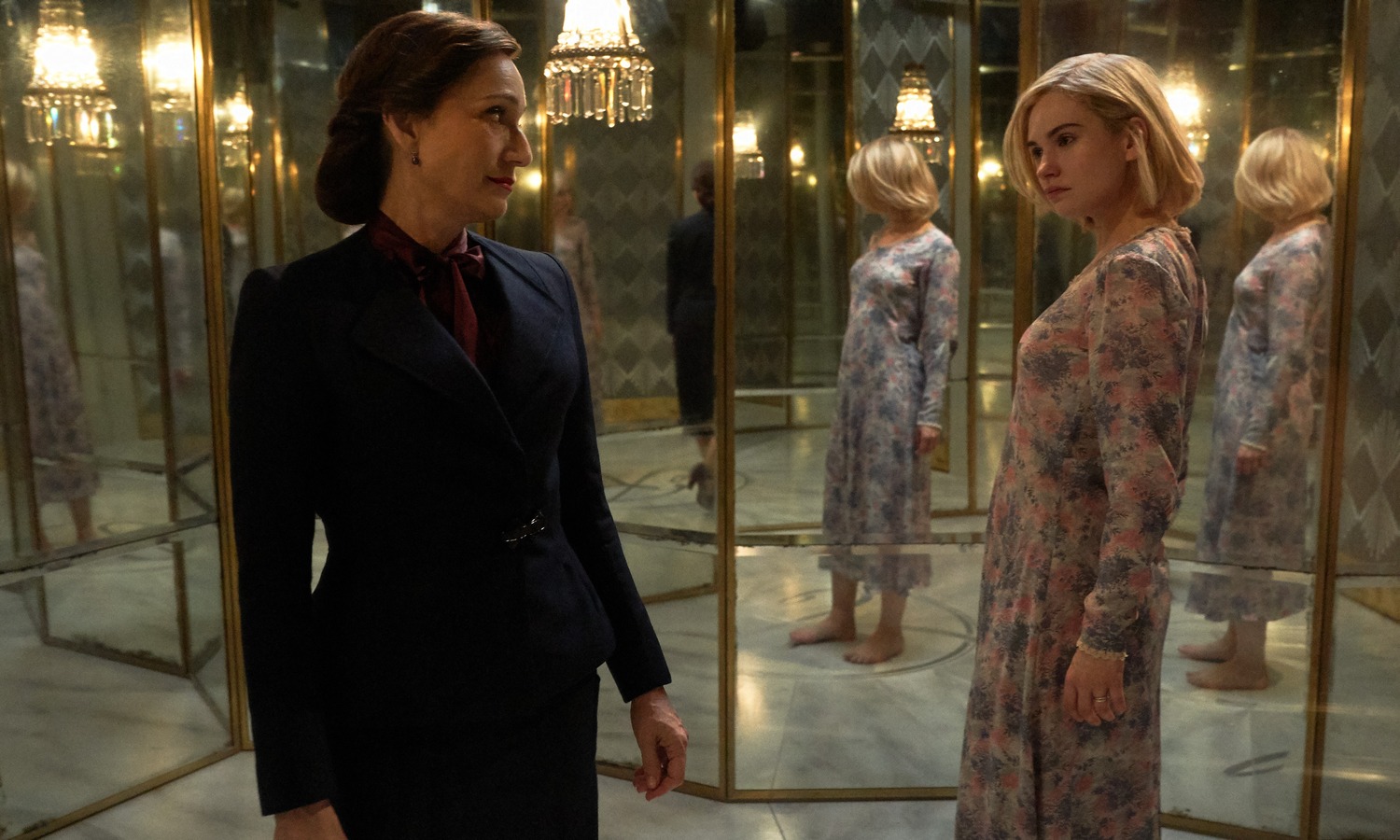This article contains spoilers for the film and book versions of Rebecca.
Leave it to Ben Wheatley to remake Alfred Hitchcock. The younger British filmmaking iconoclast has been nothing if not provocative with his filmography so far, which includes the disturbing horror-crime hybrid Kill List (2011), the serial killer black comedy Sightseers (2012), the psychedelic, very weird A Field in England (2014), and the unsettling dystopian nightmare, High-Rise (2015). But with Rebecca he takes on not just a classic Hitchcock film, but the master’s sole Best Picture winner. Why not, right?
We’re being facetious, of course. Wheatley’s version of Rebecca (now on Netflix) is not a remake of the 1940 film but a new adaptation of the 1938 novel by Daphne du Maurier on which it is based. Both films are mostly faithful to the book (with a couple of notable exceptions), but Wheatley and his screenwriters (Jane Goldman, Joe Shrapnel, and Anna Waterhouse) coax a moral ambiguity and feminist twist out of du Maurier’s multi-layered Gothic romance that wasn’t permissible in the 1940 film.
“I mean, it’s the same conversation I have about every film,” Wheatley says when we ask him over Zoom what drew him to the project. “It’s like, ‘Oh it’s a comedy. The last one you did was a horror film,’ or, ‘Oh it’s a fashion movie and last thing you did was a family drama,’ or whatever. I try and choose stuff that’s at 90 degrees from the last thing I did every time, and I’ve been lucky enough to do that.”
Wheatley adds that reading the script led him to rethink his assumptions about the story and the Hitchcock film. “What attracted me to it was initially Jane Goldman’s script,” he explains. “When I read it, I was really surprised by it. I felt all the twists and laughed at all the right bits of it. And that surprised me doubly because I had seen the Hitchcock film and I’d read the book. So I thought that was really odd, that I would misremember it in that way. I talked to a few other people and they were kind of like, ‘Yeah, Rebecca. It’s just this beautiful romance, isn’t it?’ And I’m like, ‘No. That’s not the half of it.’”
It’s fair to say that Rebecca deceptively starts off as a “beautiful romance.” In the new film–as in the book and the 1940 version–the main character is an unnamed young woman (played now by Lily James), who is working as a personal assistant to a wealthy older American (Ann Dowd) on holiday. In Monte Carlo, the young woman meets Maxim de Winter (Armie Hammer), also rich, who is quite dashing and recently widowed.
The two strike up a whirlwind courtship that results in de Winter whisking the young woman back to his ancestral estate, Manderley, as the new Mrs. de Winter. But once ensconced there, she discovers that the house is permeated with the lingering presence of her predecessor, Rebecca, who still commands the unhealthy loyalty of the mansion’s housekeeper, the sinister Mrs. Danvers (Kristin Scott Thomas). It is here that Rebecca pivots from romance to thriller, with the plot turns and psychological subtexts piling up like the waves crashing at the bottom of the treacherous cliff upon which Manderley sits.
“When I reread [the book], I just imagined du Maurier had written Rebecca as a dare or something,” says Wheatley. “That it was kind of, ‘You like romantic fiction? Well, I’ll write a book that will stop you reading romantic fiction forever. I’ll take the tropes of it, which is the widower and the holiday romance, and the rags to riches, and then I’ll really smash it and rub your nose in it.’ I loved it.”
In the book and both versions of the film, it’s revealed that Rebecca was not the perfect wife and society hostess that she was reputed to be. In fact, she was a cruel, selfish woman who claimed to Maxim on the night of her death that she was pregnant with another man’s child and would force Maxim to raise it as his own, a revelation that leads her tormented husband to shoot her dead. He disposes of her body at sea, but when the corpse washes up a year later, Maxim reveals the truth to his new wife.
Hitchcock’s film, due to the moral decrees of the Hays Production Code that was in existence at the time, had to change Rebecca’s death to a suicide since movies were not allowed to show murderers going unpunished. Under no such constraints, Wheatley takes his Rebecca a step further: The new Mrs. de Winter evolves into a protector of her husband, taking action to clear his name while at the same time fully aware that she is complicit in the cover-up of a murder.
“The moral structure of it is very different because of the things that were missing from the ’40s adaptation due to the Hays Code,” says Wheatley. “So the actual heart of the book is the idea that Maxim de Winter has murdered his wife and that you then side with de Winter and the second Mrs. de Winter as an audience member, and basically root for them to win throughout the rest of the story–which is utterly despicable. But I thought that that felt like a good reason to revisit it.”
His reasons to approach the source material aside, Wheatley knew he might touch some kind of third rail of cinema by taking on a story that the general public remembers as a Hitchcock masterpiece (it didn’t work out too well for Gus van Sant and his 1998 remake of Psycho, which like the original was also based on a novel). Getting all that noise out of his head was the first step Wheatley took.
Read more
“Right at the beginning of the process I went, ‘Oh, right. I’m going to get a kicking for this,’” he says with a laugh. “And then I didn’t think about it anymore and I made the film. I put it right to the back of my head.” But the subject inevitably came up as the director began promoting the film. “I saw the reviews [and it was like] ‘Oh my God. It’s all about Hitchcock.’ But that’s inevitable. It’s fine. The audience that’s there for this movie is a much bigger audience than just the audience of people who’ve seen that version of it.”
Wheatley says he’s less concerned with his movie being compared to Hitchcock’s than feeling as if he did justice to the novel. “I had a lot of questions about filling the shoes of Hitchcock and all this,” he remarks. “It really isn’t about that. It’s filling the shoes of du Maurier. That’s the challenge and the fear of taking a book that is so beloved and so central within a culture in lots of ways and so influential. To take that and balls that up is the problem. The other adaptation is done and everyone loves it. There’s going to be no shifting of that from the pedestal of cinema history by anything I did.”
Of course Wheatley wasn’t the only one dealing with the ghosts of adaptations past. His trio of leads–James, Hammer, and Thomas–took on characters first embodied on the screen by Joan Fontaine, Laurence Olivier, and Dame Judith Anderson.
“With Lily, we talked a lot about the agency of the character,” says Wheatley when asked how he approached each actor about their roles. “But there’s the aspect of the book where you don’t know if you believe what the first-person narrative is saying. She says she’s very weak, but at the same time her actions are strong. So is she slightly self-serving in how she talks about herself? And is the whole truth there?”
He continues, “That’s the craft, I think, of Lily James’ performance, trying to be nervous and terrified, but also not capsizing the movie by being irritating or being too confident or strong.”

As for Hammer’s portrayal of the equally enigmatic Maxim de Winter, “It was more the other way around of taking someone from the position of being completely in control and being like a matinee idol and then just destroying them over the period of the movie,” Wheatley says. “But then as usual, the film is not shot in chronological order. So it’s an absolute nightmare to track all those kinds of performances. But that’s basically what we talked about a lot.”
When it came to casting Mrs. Danvers, perhaps the most iconic of the story’s three leads, Wheatley says he was “totally” enraptured with the idea of the great Kristin Scott Thomas taking on the part. “This version of it is a kind of more sympathetic Danvers,” he reveals. “I think that had come out of reading it and going, ‘I feel like she’s the moral center of it in many ways.’ There was a lot of quite complicated emotional stuff that she had to do–to go from being stern to being vulnerable, from beat to beat to beat. And I think that it took someone of her kind of pedigree to be able to do that.”
Whether viewers come to the new Rebecca with their own memories of the book or the original movie, or tune into Wheatley’s version with no preconceptions in mind, the director thinks that a new version of the story, some 82 years after the book was first published and 80 since the release of Hitchcock’s film, could have a different impact on new generations of viewers experiencing it for the first time.
“I think every film that you make is putting the film through your experience of the moment,” he explains. “So I think that there are things that are happening now which become more pertinent, and there’s also general universal truths. The idea of, what is your history of your own partner? How do you deal with the jealousy of that and the obsession? What would you do in this situation? How do you compete with ex-partners? That kind of stuff. It’s also a tale of privilege, of someone who can float through life because they’re good-looking and rich, and they do what they like and get away with murder.”
Rebecca is streaming now on Netflix.


